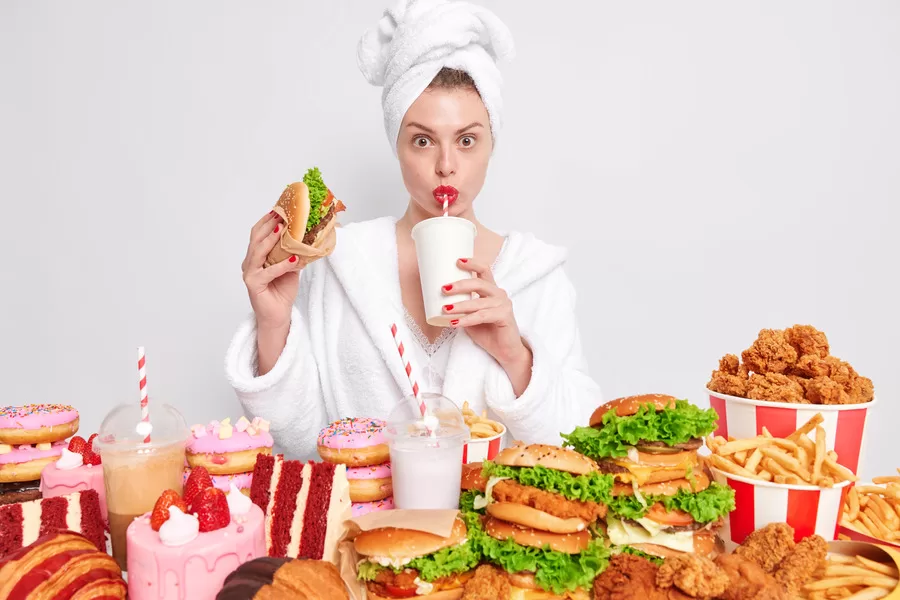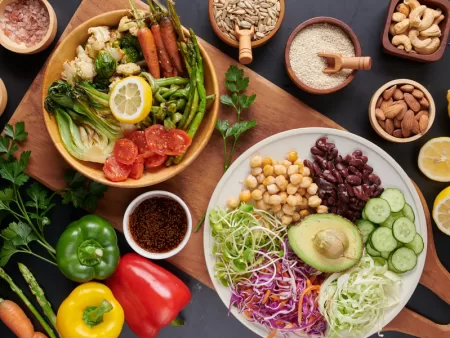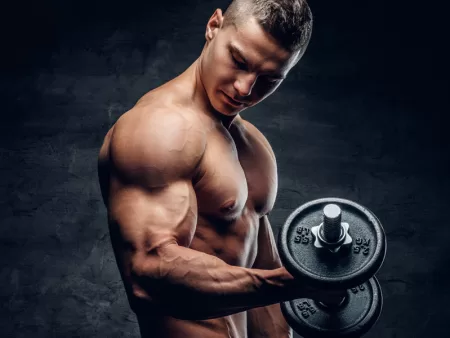
Have you ever wondered why your rigorous gym routines aren’t translating into the muscle gains? The answer might be lurking in your kitchen. Certain foods, while seemingly harmless, can drastically impede your muscle-building journey.
Understanding Sugar’s Role in Your Muscle-Building Journey
Building muscle? Let’s talk about sugar – a common part of our diets that might be affecting your progress more than you think.
The Energy Dilemma: Sugar’s Quick Fix and Fast Fall
Eating something sweet gives you a quick energy boost, right? But that energy doesn’t last. Soon after, you’ll likely feel tired and less motivated. For building muscle, you need steady, long-lasting energy. Sugar’s quick ups and downs are not helpful for keeping a consistent workout routine.
Nutrition Swap: Why Sugar Takes More Than It Gives
Sugar is a bit of a space-taker in your diet. It fills you up but doesn’t bring many useful nutrients to the table. Your body needs proteins, good fats, and complex carbs to build muscle. But if you eat a lot of sugar, there’s less room for these important foods.
Unwanted Fat: Sugar’s Sneaky Side Effect
When you eat more sugar than your body can use, it stores the extra as fat. This can be a problem when you’re trying to get stronger and leaner. The added fat can hide the muscles you’re working so hard to build. By eating less sugar, you can help keep this unwanted fat away.
Overworking Insulin: Sugar Puts Pressure on Your Body
Your body uses a hormone called insulin to handle sugar. If you eat a lot of sugar, insulin has to work really hard. Over time, this can lead to problems with how your body uses insulin, which can make it harder to build muscle and burn fat.
Recovery Times: Sugar Might Slow You Down
After exercising, your muscles need to repair and grow. Sugar can slow down this process. Not having sugar can help your muscles recover faster, so you’re ready for your next workout sooner.
While sugar might be tempting, it’s not the best friend for your muscles. Eating less sugar means your body can focus on building muscle without these extra challenges. It’s a small change that could make a big difference in your muscle-building journey.
How Dairy and Fried Foods Fit into an Athlete’s Diet
Ever wondered how your favorite dairy products and those occasional fried food cravings fit into your athletic regimen?
Dairy
Dairy, known for its calcium and protein, is often seen as a good pick for athletes. It helps in building strong bones and repairing muscles. But remember, not all dairy is the same. Full-fat dairy might add unwanted calories that can lead to weight gain, which isn’t ideal if you need to stay light and speedy. Choose low-fat dairy products to get the benefits without the extra fat.
Fried Foods
Fried foods are tempting, but for athletes, they can be a bit of a setback. Rich in calories and fats, they might slow you down and make you feel sluggish. Plus, they don’t help much with muscle recovery. It’s best to enjoy them only once in a while and focus on foods that are more beneficial for your training and performance.
Striking the Right Balance
It’s all about balance. You can have dairy and fried foods, but the key is moderation. Include plenty of fruits, vegetables, lean proteins, and whole grains in your diet. These foods will provide the energy and nutrients you need for training, without the drawbacks of too much fat and calories.
While dairy and fried foods can be part of an athlete’s diet, it’s important to choose wisely. Opting for healthier versions and maintaining a balanced diet will keep you on track with your fitness and health goals.
Refined Carbs and High Sodium
Refined Carbs
Are like those flashy quick fixes – they promise immediate energy but leave you in a lurch. Foods like white bread, cookies, and sugary cereals give you an instant energy spike, but the crash that follows. Not so fun. This erratic energy is a no-go for athletes who need steady fuel for training and competition. Plus, munch on these too much, and you might find your fitness goals getting a bit… flabby.
It’s not just about the calories. Refined carbs are notorious for their disappearing nutrient act. They’re stripped of the wholesome goodness of fiber, vitamins, and minerals during processing, leaving you with, well, not much.
High Sodium
Then there’s sodium – a necessary nutrient but a tricky when in excess. Found in lots of processed and packaged foods, too much sodium can bloat your performance and put your heart health on the line.
While refined carbs and high sodium might be easy picks in the dietary draft, they’re not the MVPs for your athletic goals. Opt for whole grains, fresh fruits, lean proteins, and keep the sodium on the down-low. Your body will reward you with better performance, more endurance, and stellar health.
Artificial Additives and Sweeteners
1. Artificial Additives
Those colorful, long-lasting processed foods might catch your eye, but the artificial additives they contain can be party poopers for your body. Some people might experience allergies or tummy troubles from these synthetic guests. Imagine trying to lift weights or sprint with an upset stomach – not fun, right?
2. Artificial Sweeteners
Artificial sweeteners, like those in diet sodas and sugar-free snacks, might seem like a smart shortcut to avoid sugar. But guess what? They might trick your body into wanting more food, leading to overeating and weight gain.
3. Gut Health and Muscles
Your gut health is a big deal – it’s like the control center for your body. But artificial additives and sweeteners might disturb the peace down there, upsetting your gut’s good bacteria. A happy gut means better digestion, more energy, and a stronger immune system, all of which are super important for anyone hitting the gym regularly.
Hormones are like your body’s messaging app, keeping everything in balance, including muscle growth. But, some artificial ingredients can mess with these messages, potentially throwing your muscle-building efforts off track.
While artificial additives and sweeteners might make food taste better or last longer, they’re not the best gym buddies. Going for natural, whole foods is like choosing a reliable workout partner – they support your health and fitness goals without any sneaky side effects. Stay fit, eat clean, and keep rocking your workouts!
Nutrition Basics Every Athlete Should Know
For athletes, what you eat is a big part of your success. Your body needs the right kinds of fuel to perform and recover.
1. Carbohydrates
Carbs are super important for athletes. They give you the energy you need for all your activities. Whole grains, fruits, and veggies are great sources. They keep you powered up for longer, so you don’t run out of energy quickly.
2. Protein
Protein is all about building and fixing your muscles. After you work out, protein helps your muscles repair and grow. Foods like chicken, fish, eggs, and beans are really good for protein.
3. Fats
Fats are really important too. They give you energy that lasts a long time, which is great for endurance sports. Healthy fats come from foods like nuts, avocados, and olive oil.
4. Hydration
Drinking enough water is crucial, but when you sweat a lot, you also lose salts. Sometimes, especially after a long workout or on hot days, you need to drink something with electrolytes. This helps keep your body’s salt and water levels balanced.
5. Micronutrients
Micronutrients are small nutrients that make a big difference. They help your body in lots of ways, like keeping your bones strong and giving you energy. You can get them by eating different kinds of fruits, veggies, and lean proteins. They’re like the hidden helpers that keep your body working well.
Every athlete is different, so there’s no perfect diet that works for everyone. The best thing to do is try different foods and see what makes you feel best. Eating lots of different healthy foods and staying hydrated is a great way to support your training and performance.
Essential Supplements for Athlete
It is possible that even with proper nutrition, your body will not have enough of some vitamins. Supplements can help you and your muscles with this.
- Whey Protein. It jumps into action right after your workout, helping those muscles rebuild and grow stronger. It’s not just about bulking up; it’s about giving your muscles the TLC they need after you’ve pushed them hard.
- BCAAs. Meet the dynamic trio – leucine, isoleucine, and valine, a.k.a BCAAs. Perfect for when you’re pushing the limits and need your muscles to bounce back, pronto!
- Creatine. Need a quick energy boost for those intense training sessions? Creatine is your go-to. It’s giving you that extra oomph when lifting weights or sprinting. Plus, it helps with muscle recovery—double win!
- Omega-3s. Omega-3 fatty acids are like your body’s peacekeepers. They keep inflammation in check, which means faster recovery and less soreness.
- Vitamin D. Not enough sun in your life? Vitamin D’s got you covered. It keeps your bones strong (essential for athletes!) and boosts your immune system. It’s like bottled sunshine for your body, keeping you healthy and ready to tackle any challenge.
- Iron. Iron is crucial for athletes. It’s oxygen transporter in your body, making sure your muscles get all the oxygen they need during those intense workouts. Keeping your iron levels up means you can train harder and longer without running out of steam.
Remember, supplements are here to boost your diet, not replace it. Pair them with wholesome foods, and you’ve got a winning combo. Stay informed, listen to your body, and keep pushing your limits.
Conclusion
Sugar provides quick energy but leads to crashes, making it unsuitable for consistent muscle building. Choosing low-fat dairy and consuming fried foods in moderation can balance an athlete’s diet. Refined carbs and high sodium offer quick energy but lack nutritional value and can impact health. Artificial additives and sweeteners may disrupt gut health and affect muscle building.
Supplements like whey protein, BCAAs, creatine, omega-3s, Vitamin D, and iron can enhance athletic performance and recovery when used alongside a balanced diet.
FAQs
Dairy is definitely great, but choose your dairy wisely! Go for low-fat options to get all the muscle-loving protein and bone-boosting calcium without the extra fat
Of course, treat yourself sometimes! But remember, fried food is like lazy Sundays: it’s good sometimes, but not so good if there’s a lot of it and you’re trying to stay fit and active.
Think of supplements like your personal cheer squad. Whey protein, BCAAs, creatine, and omega-3s can really amp up your performance and recovery game.







